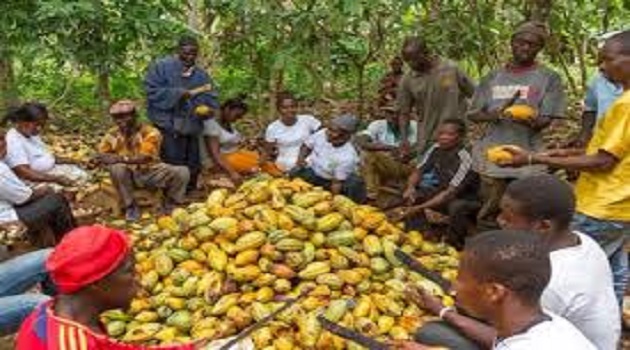Ten African countries commit to sustainable commodities…Palm oil, cocoa, coffee, rubber, and other tree crops are in sharp focus as African govt’s commit to responsible production at CoP27
Ten African countries commit to sustainable commodities...Palm oil, cocoa, coffee, rubber, and other tree crops are in sharp focus as African govt's commit to responsible production at CoP27

Ministers from ten African countries have signed up for the Africa Sustainable Commodities Initiative Declaration, a single set of principles for the responsible production of agricultural commodities in Africa.
The signing ceremony took place in Sharm El-Sheik, Egypt, at the Ghana Pavilion, attended by Ministers from the signatory countries at the ongoing Climate Change Conference (COP27).

The Africa Sustainable Commodities Initiative (ASCI) puts producer countries in Africa at the forefront of defining the principles for the sustainable development of cocoa, rubber, palm oil, coffee and other commodities in a way that protects livelihoods and protects natural resources, including forests.
ASCI builds and expands upon principles agreed upon at CoP22 in 2016 for the palm oil sector. The ‘Marrakesh Declaration for Sustainable Development of the Palm Oil Sector’ acknowledged the role of agricultural commodity development as a driver of deforestation while emphasising the critical role of forests and forest conservation in addressing climate change.
The Marrakesh Declaration has been implemented through the African Palm Oil Initiative (APOI), comprised of ten countries in West and Central Africa: Cameroon, Central African Republic, Côte d’Ivoire, Democratic Republic of Congo, Edo State (Nigeria), Gabon, Ghana, Liberia, Republic of Congo and Sierra Leone. These countries account for 25% of the world’s tropical forests and 75% of Africa’s forests. An initiative of the Tropical Forest Alliance, the APOI is facilitated by Proforest, who will be supporting the Africa-led Africa Sustainable Commodities Initiative.
“From CoP22 in 2016, when the Marrakesh Declaration was signed, we saw huge progress at CoP26 in 2021 where every country demonstrated crucial milestones to achieve the sustainable development of palm oil,” said Abraham Baffoe, Global and Africa Director of Proforest. “Many countries have recognised the need to work across multiple commodities, so the launch of ASCI is an important progression, as a truly multi-stakeholder initiative, with every country engaging at the regional, national and local level throughout the process.”
At CoP26 in Glasgow in 2021, signatories of the Marrakesh Declaration met to recognise and share five years of progress, with significant milestones from legal frameworks for land rights to private sector commitments on restoration and investment in smallholders to boost productivity while protecting forests. Ministers agreed that the issues being addressed in palm oil were the same in other commodities, catalysing the transition to the Africa Sustainable Commodities Initiative to ensure all sectors are aligned to drive positive outcomes for people, nature and climate.
“We need the guardians of the forests – national governments and local communities – to own and lead solutions on the ground that integrate agricultural commodity production and local livelihoods with forest protection,” continued Baffoe. “Embedding those rights and protection in laws and regulation will provide an enabling environment where we can continue to build capacity, readying the way for further investment and scale.”
Governments have recognised the potential for growth in the production of palm oil, cocoa and other agricultural commodities to meet increasing global demand and to contribute to food security and better livelihoods for millions of Africans while protecting the region’s remaining rainforests. Diversification of food production also provides resilience, improves each country’s food security, and helps offset the impact of climate change. The Congo Basin alone can hold 30 billion tonnes of carbon, equivalent to three years of global fuel emissions, and its forests are essential for regional climate stability.




